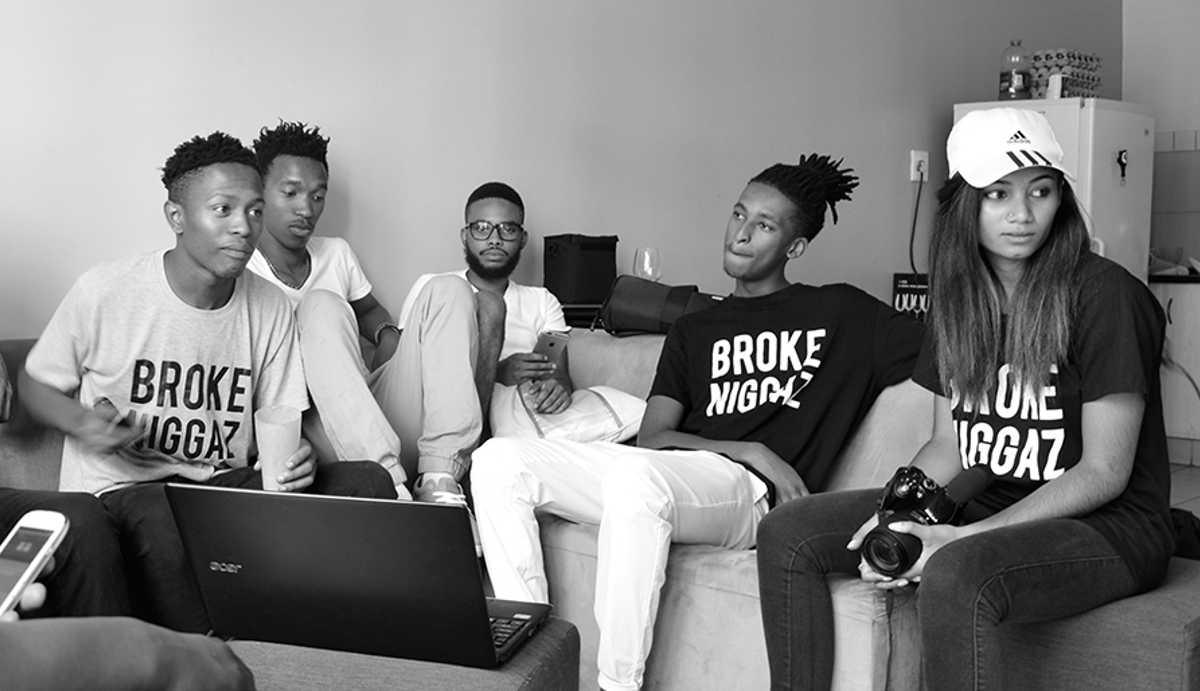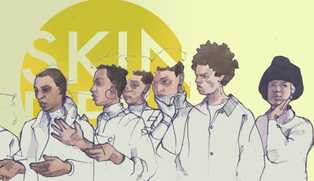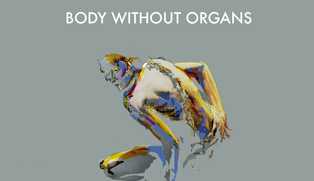Broke Niggaz Film 1: Subject (Don’t) Matter
In the first episode of the YouTube vlogging series Broke Niggaz, Menzi the narrator holds the camera and tries to capture his friends walking down a residential street in Johannesburg, South Africa. “It’s dark,” one of the boys in the crew says, and it is not only the first clear sentence of the vlog but an observation so obvious it says less about the night and more about the visual effects of the filming. The webseries is in black and white, and without much additional lighting only the glare of the streetlights or the sparks from cigarette butts reveal their faces. The sound is as unclear as the image, though not on purpose. Underneath the video a viewer has written in the comment section, “Dawg Wish Your Sound Was Better Quality, You Using A D1100 Or D1200 To Record?” Menzi has responded, “yeah I plan to buy some sound equipment for my cam soon. I use a Canon 600D.” The vlogs’ theme of honest conversation has spilled out beyond the twelve minute episode.
Vlogging provides a better space than blogging for those of us trying to listen in on conversations going on in cities we might never live in. We are able to put the voices with a face and the faces with a swag, and the darkness of the images accidentally allows us to feel like we are also walking through the night as we squint at the video. The first topic of conversation in the episode is on the politics of collaborative creative control as Menzi jokes about putting his name on all the credits, “That was like Michael Jackson with thriller, it was like directed by Michael Jackson, produced by Michael Jackson, choreography Michael Jackson.” Thube retorts “We have input though.” Menzi chuckles answering, “I’m gonna credit y’all, imma be like ‘special thanks…’” As the series progresses, Thube’s remarks become foresight. The charm of the show is in the different vibes of each crew member and the exploration of male friendship within a space of intimate and experimental conversation.
For a group of young black men in contemporary Johannesburg, the question of collective creative control of a show is more political than the crew reveals on their walk down the street, but the name “Broke Niggaz” unambiguously speaks to a history of racial marginalization in the film industry inside and outside of South Africa.YouTube has offered a solution, creating a free and uncensored platform for unaccredited film makers who create shows about perspectives we never knew we cared about. Issa Rae’s The Misadventures of AWKWARD Black Girl portrays L.A. from the insecure eyes of a woman unable to resolve the conflicting identities of being black and awkward. Inspired by Issa, Nicole Amarteifio’s An African City shows Accra through the lives of fashionable minister’s children spending our tax money. Broke Niggaz follows in these footsteps by vlogging about broke friends enjoying Joburg. In the shock of discovering the necessity of these perspectives to our lives, we become addicted. “The concept of the filmmaker or the photographer used to be so exclusive but not any more,” Menzi declares, enjoying the freedom of disregarding gatekeepers and experimenting online.
Freedom is not always as freeing as it seems though, and an open film market does not necessarily make it a fair or equal one. Though Broke Niggaz responds to the crew’s financial limitations by making the limitation a part of their aesthetic, the contradiction in their endeavor to keep it real but also make a living in a capitalist world remains unresolved. “Broke Niggaz is almost a critique of everything in the pop culture we fuckin with right now, the glamour, the fakeness, the pretentiousness…The show is called broke niggaz but then I get people who will watch my shit and say, ‘yo you’re such a cool kid,’ but that’s ironic because the whole point of the show is to break that idea,” Menzi says. Refusing to be cool is not an option, however, if they are going to sell those Broke Niggaz t-shirts they wear on every episode, and if we are going to be bothered to listen. The show walks the line between celebrating free platforms but also hoping to get paid, the desire to portray normal life but also be experimental with filming, and the desire to be seen as an artist but also just another regular dude. The series reflects the romantic and sometimes incompatible combination of never compromising on creating something for yourself, but also producing a self that can be consumed by others.
Broke Niggaz Film 26: 15K
“My question to you is are you reluctant to enter a girl who has a massive amount of followers?” Zweli opens up the discussion in my favorite episode of the series, and the crew’s thoughts spill out like a poem I would never write but want to read.
There’s etiquette when you’re trying to follow a girl that’s popping out there on the streets / Why does she have 15 thousand followers though? / Cause she fly / You should probably be deep with your comments so you stand out / I like a picture from like 98 weeks ago so that she knows that I was there deep in the trenches / Those emojis that make you look thirsty / You gotta like the picture with the family / Will she require the same attention that she has been receiving from her followers? / I’m not an ugly nigga dawg / Rich niggaz or celebrities want her / Why is there only a picture of you in Mozambique?Baecation but you the only one in the photos? / Girls with a lot of followers have the world at their feet / These girls are gassed / They are gassed so hard / Gas is a real thing…
If followers are the currency of social media, then the title of the episode reminds us that there are many ways to be broke. The crew’s thoughts expand on online brokeness, asking: how does a man become visible and attractive in the age of social media? If the YouTube views tell us anything, Broke Niggaz is not yet 15K fly, which means that the crew must still grapple with the struggles of being almost knowable but potentially still invisible in the sea of likes on a hot girl’s instagram page. The anxieties around women with more followers and therefore more social currency is the youthful version of the fear that women reject men with no money.
In the name “Broke Niggaz” is the inevitable unravelling of sexual politics. In a world haunted by Kanye West’s anxieties, the title of the vlog is reminiscent of the line, “I ain’t sayin she’s a gold digger, but she aint messin with no broke niggaz.” The crew is aware that in the capitalist sexual gospel, brokeness is next to wackness, and they deliberately decide to speak from this place. As they converse about women, they are also aware that women will be watching. The vlog allows them to expand on the complexities of their feelings, on literature, on music, on everything else they have to offer but money. It functions as a three dimensional instagram page or a ten minute snapchat. In the first few episodes of the vlog the introductory scene is a shot of Menzi holding a camera to his face, followed by a hovering shot where the viewer looks down at a shirtless and tattooed Menzi. It is a reminder that the vlog functions as a way for the crew to also present themselves as sexual beings.
Broke Niggaz Film 9: “Sorta Kinda Not So Famous”
“I want to be great. I want to be remembered like a Bob Marley. When I look to the side of my enemies, I wanna have that effect on my world and my people. Because if someone did it for me, I just want to pass the goodness on. I’m really harsh in my approach and I really don’t care at this moment in time. From a political standpoint, where we are as a country, and where our leaders are taking us, I don’t have time to loligag or be wishy washy. I’ve got a very bad reputation in the industry for speaking my mind. I do not kiss ass. I do not suck dick. I do not give a fuck. If it’s not with what I’m on about, it’s not true, it’s not honest, and it’s not solving our problems or freeing our people, then I’m so not about that. It comes with its good and it comes with its bad but I’d rather die like this than down on my knees.”
The ninth episode of Broke Niggaz begins with Menzi recording a talk by an artist who speaks about the necessity of harshness in the pursuit of creative freedom. There is an ironic vulnerability about the necessity of being harsh that responds to the reality of having no protection or power within a “system” that is never going to accommodate honesty from those it is trying to exclude.
Michael Jackson, whose music videos were the first to be on MTV, and who will always be remembered as the King of Pop, was a man who had all sorts of creative control by the end of his career. A man who was not harsh, though he was always creatively accurate. Yet he never looked like a man who got to say all that he wanted to. I listen to the monologue and all the vague and unresolved ideas of what it means to be great, to liberate your people, to be honest, to be true, and I have this feeling that blackness always complicates the ability to be all of those things at once.
When the monologue ends and the crowd is getting up to go shake the artist’s hand, the camera starts spinning and the room gets blurry. A voice says, “I love your stuff bra,” and you can not see where the voice has come from. Is someone saying it to the performer, or is a crowd member saying it to Menzi? Though it becomes obvious that the anonymous voice is speaking to Menzi, this temporary ambiguity of who is being thanked links the tone and the message of the monologue to the aspirations of the show.
In a later episode, Menzi answers this question of what it might mean to have creative control but to do so in a way that is true and liberating. Menzi is asked what he would do if he was told to cut certain friends from the show and sell it for a million dollars. He says, “Let’s say I get 10 mill and they’re selling Broke Niggaz clothing, they sell it, bunch of white kids buy it. Black people are gonna come to me and say, who said you could do this?” Menzi sees the term “Broke Niggaz” as belonging to the world of black culture, a world that can be shared but not sold to just anyone. The t-shirts they wear everyday in their videos are a celebration and enjoyment of their own lives and not for reckless consumption. Selling brokeness for free might not be perfect, but there’s a freedom there.
Broke Niggaz Film 11: At Long Last
The crew finally decides to formally introduce themselves, and the theme is what the term “Broke Niggaz” means to them and what the show might represent.
“It sparked out of frustration, like, the frustration of not knowing other artists or being put on by other artists or exhibiting the way other artists are.”
“There’s no censorship to this whole thing cause we’re us.”
“We are not creating stuff for the people, we are creating stuff for ourselves and we are just inviting the people… It’s not even about being broke.” (skeptical laughter )
“But the table is empty.”
“The term broke niggaz is just a nigga that’s on the come up that doesn’t have it but he’s trying to get it.”
There is no rush to agree, this is a conversation not a debate. The open exploration of the show reveals that maybe an important tool in this capitalist world is changing our notions of what it means to be broke. Capone recognizes this and simply says, “We are working towards something right now, it’s not like we are sitting here and scratching our ballsacks.”



